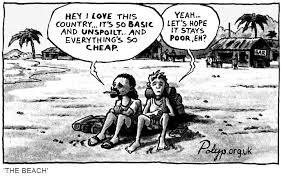Summary:
As much as there has been an institutional turn in mainstream economics, since the 1980s, which is not completely dissociated from the anti-Keynesian turn that started in the 1970s and led to the segregation of heterodox groups within the profession, there has been a poverty-turn in the development economic literature, as noted by Jayati Ghosh.Particularly important in this shift is that:"Macroeconomic processes are entirely ignored: patterns of trade and economic activity that determine levels of employment and its distribution and the viability of particular activities, or fiscal policies that determine the extent to which essential public services like sanitation, health and education will be provided, or investment policies that determine the kind of physical infrastructure available and therefore the backwardness of a particular region, or financial policies that create boom and bust volatility in various markets. No link is even hinted at between the enrichment of some and the impoverishment of others, as if the rich and the poor somehow inhabit different social worlds with no economic interdependence at all, and that the rich do not rely upon the labour of the poor.
Topics:
Matias Vernengo considers the following as important: Economic Development, Ghosh, Poverty
This could be interesting, too:
As much as there has been an institutional turn in mainstream economics, since the 1980s, which is not completely dissociated from the anti-Keynesian turn that started in the 1970s and led to the segregation of heterodox groups within the profession, there has been a poverty-turn in the development economic literature, as noted by Jayati Ghosh.Particularly important in this shift is that:"Macroeconomic processes are entirely ignored: patterns of trade and economic activity that determine levels of employment and its distribution and the viability of particular activities, or fiscal policies that determine the extent to which essential public services like sanitation, health and education will be provided, or investment policies that determine the kind of physical infrastructure available and therefore the backwardness of a particular region, or financial policies that create boom and bust volatility in various markets. No link is even hinted at between the enrichment of some and the impoverishment of others, as if the rich and the poor somehow inhabit different social worlds with no economic interdependence at all, and that the rich do not rely upon the labour of the poor.
Topics:
Matias Vernengo considers the following as important: Economic Development, Ghosh, Poverty
This could be interesting, too:
Nick Falvo writes Homelessness among older persons
Nick Falvo writes Homelessness planning during COVID
Nick Falvo writes Demand-side housing assistance
Robert Skidelsky writes The Roots of Europe’s Immigration Problem – Project Syndicate
 As much as there has been an institutional turn in mainstream economics, since the 1980s, which is not completely dissociated from the anti-Keynesian turn that started in the 1970s and led to the segregation of heterodox groups within the profession, there has been a poverty-turn in the development economic literature, as noted by Jayati Ghosh.Particularly important in this shift is that:"Macroeconomic processes are entirely ignored: patterns of trade and economic activity that determine levels of employment and its distribution and the viability of particular activities, or fiscal policies that determine the extent to which essential public services like sanitation, health and education will be provided, or investment policies that determine the kind of physical infrastructure available and therefore the backwardness of a particular region, or financial policies that create boom and bust volatility in various markets. No link is even hinted at between the enrichment of some and the impoverishment of others, as if the rich and the poor somehow inhabit different social worlds with no economic interdependence at all, and that the rich do not rely upon the labour of the poor. This shuttered vision is particularly evident in the neglect of the international dimension in such analyses, and of the way in which global economic processes and rules impinge on the ability of states in less developed countries to even attempt economic diversification and fulfillment of the social and economic rights of their citizens."The notion that development, and that meant industrialization, is central for elimination of poverty has vanished. But the mainstream has adopted a pro-poor stance. And who is really against reducing poverty?
As much as there has been an institutional turn in mainstream economics, since the 1980s, which is not completely dissociated from the anti-Keynesian turn that started in the 1970s and led to the segregation of heterodox groups within the profession, there has been a poverty-turn in the development economic literature, as noted by Jayati Ghosh.Particularly important in this shift is that:"Macroeconomic processes are entirely ignored: patterns of trade and economic activity that determine levels of employment and its distribution and the viability of particular activities, or fiscal policies that determine the extent to which essential public services like sanitation, health and education will be provided, or investment policies that determine the kind of physical infrastructure available and therefore the backwardness of a particular region, or financial policies that create boom and bust volatility in various markets. No link is even hinted at between the enrichment of some and the impoverishment of others, as if the rich and the poor somehow inhabit different social worlds with no economic interdependence at all, and that the rich do not rely upon the labour of the poor. This shuttered vision is particularly evident in the neglect of the international dimension in such analyses, and of the way in which global economic processes and rules impinge on the ability of states in less developed countries to even attempt economic diversification and fulfillment of the social and economic rights of their citizens."The notion that development, and that meant industrialization, is central for elimination of poverty has vanished. But the mainstream has adopted a pro-poor stance. And who is really against reducing poverty?
